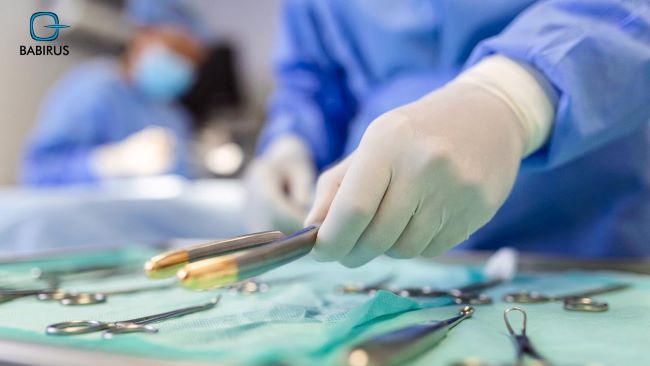Surgical Instrument Care and Handling

Surgical instrument care and handling are more than essential to keep them in the best condition and provide the best functionality in medical procedures while ensuring patient safety and accurate outcomes.
Meaning that surgical instrument handling and care are more than required to maintain their effectiveness and longevity.
This article will discuss the importance of proper surgical instrument care and handling, as well as the essential steps for cleaning surgical instruments.
The Importance of Proper Care and Handling:
Surgical instruments are expensive and delicate tools that require careful care, not only due to their price, but because improper handling can cause damage, contamination, and even patient harm.
Here are some of the key reasons why proper sterilization of surgical instruments is vital:
· Preventing Contamination:
One of the primary concerns when it comes to surgical instruments is preventing contamination during the operation with proper surgical instrument care. That involves accurate cleaning, disinfection, and sterilization processes.
Moreover, when performing these processes, healthcare experts need to follow strict guidelines and protocols to ensure that all microorganisms are eliminated from the instruments.
On the other hand, failing to follow these guidelines can result in the transmission of infectious diseases, which can have severe consequences for patients.
· Maintaining Functionality:
Proper surgical instrument care and handling are also essential for maintaining the functionality of surgical instruments.
As these instruments are exposed to significant wear and tear during medical procedures, and improper handling can lead to damage and reduced effectiveness.
Thus, regular maintenance, such as sharpening, adjusting, and lubricating moving parts, is necessary to ensure that these instruments remain in good working condition.
· Reducing Costs:
If you aim to reduce the costs that are attached to replacing surgical instruments, then you need to apply proper surgical instrument care and handling.
As the improper handling will damage the instrument and that will lead to the need for replacement or repair. Moreover, regular surgical instrument maintenance can help extend the lifespan of these instruments, reducing the need for frequent replacements and ultimately saving healthcare facilities money.
· Patient Safety:
The main goal of using high-quality surgical instruments and effective surgical instrument care and handling is patient safety.
Simply because well-maintained and handled instruments help ensure that medical procedures are carried out safely and effectively. With low infection risk, maintaining functionality, and minimizing the risk of injury.
The 6 Essential Steps for Instrument Care:
If you are wondering how to clean surgical instruments after surgery? Or even what solutions are used to clean surgical instruments? To maintain the effectiveness and longevity of them then you should read these basic steps:
Step 1: Cleaning and Disinfection
The initial stages in handling and caring for surgical instruments are cleaning and disinfection. As this is the first step as immediate cleaning of the surgical instrument will stop bacteria and debris from growing.
Moreover, to clean the instruments, use warm water and a light detergent. Pay close attention to any places where debris could collect, like the lumens and joints. Before disinfection, make sure the instruments are totally dry after washing and rinse them well with clean water.
Now to the part about how to disinfect surgical instruments properly. Disinfection involves using chemical materials to kill bacteria, viruses, and fungi on the surface of the instruments.
There are several methods of disinfection, including:
- High-level disinfection, which uses chemicals that kill all bacteria, viruses, and fungi.
- Low-level disinfection, which uses chemicals that kill only bacteria.
Thus, it is essential to follow the manufacturer’s instructions for the disinfectant used to achieve the best cleaning level and ensure proper usage and effectiveness.
Step 2: Sterilization
Sterilization is the process of eliminating all forms of microbial life, including bacteria, viruses, fungi, and spores from the surgical instrument surface. That is why sterilization is essential for surgical instruments care.
So, if you are wondering what are the different methods of surgical instrument sterilization?
We can tell you that there are several methods of sterilization, including:
- Steam sterilization, which uses high-pressure steam to kill microorganisms.
- Ethylene oxide sterilization uses a gas to sterilize instruments that cannot withstand high temperatures or moisture.
Step 3: Inspection and Maintenance
The longevity and efficacy of surgical instruments depend on routine inspection and maintenance. This means that you need to examine the instruments both before and after each use for indications of wear, damage, or corrosion.
To discover any damage immediately and replace or repair the instrument as needed. Moreover, regular lubrication of moving parts is also necessary to ensure smooth functioning and stop wear and tear.
Step 4: Storage
Suitable storage of surgical instruments is crucial for their longevity and effectiveness, as these delicate tools must be stored in a clean, dry, and well-ventilated area away from direct sunlight.
Furthermore, do not neglect to use instrument trays or cases, and keep them properly organized to protect instruments from damage during storage, and improper handling.
Step 5: Training and Education
Anyone handling or using surgical instruments needs to have received the appropriate instruction and training. And the surgical instrument cleaning, disinfection, sterilization, inspection, maintenance, and storage procedures should be professionally taught to staff members.
As that is the best way to guarantee that personnel are educated about the most recent and best practices for handling and caring for surgical instruments.
Step 6: Maintenance
Regular maintenance, such as sharpening blades and replacing worn parts, can extend the life of surgical instruments and maintain their effectiveness during surgeries.
Eventually,
Surgical instrument care and handling require a systematic and organized approach that involves accurate cleaning, sterilization, storage, maintenance, and staff education.
By adhering to best practices in each of these areas, healthcare facilities can minimize the risk of infection transmission, maintain instrument quality, and ultimately improve patient outcomes.
